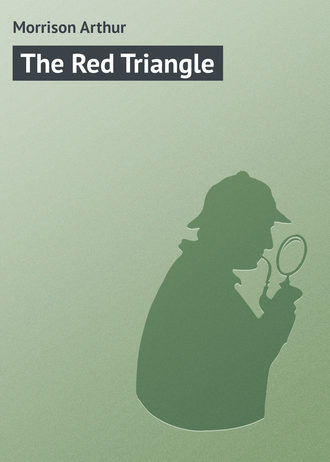 полная версия
полная версияThe Red Triangle
"He took a chair, and sat for a little while with his head forward on his hand and his eyes directed towards the floor. Then he said, in a musing way, rather as though he was thinking aloud than talking to me, 'You were right, after all, Potswood, and I was a fool to disregard your warnings. I oughtn't to have dabbled – I should have left those things alone.'
"I said nothing, thinking it best not to disturb him, but to leave him free to say what he wanted to say in his own way. He remained quiet for a minute or two more, and then sat up with an appearance of much greater composure. 'You mustn't mind me, Potswood,' he said. 'As I've told you, I'm in a bad state of nerves, and at best I'm an impulsive sort of person, as you know. I needn't have bothered you like this – I came rushing round here without thinking, and if the house had been a bit farther off I should have come to my senses before I reached you. After all, there's nothing so much to disturb one's-self about, and this man – this Denson – may very well have deserved his fate. Don't you think that likely?'
"He added this last question with an involuntary eagerness that scarcely accorded with the indifferent tone with which he had begun. I answered guardedly. I said of course nobody could say what the unhappy man's sins might have been, but that whatever they were they could never justify the fearful sin of murder. 'And,' I added, 'if you know anything of the matter, Mason, or have the smallest suspicion as to who is the guilty person, I'm sure you won't hesitate in your duty.'
"'My duty?' he said. 'Oh yes, of course; my duty. You mean, of course, that any law-abiding citizen who knows of evidence should bring it out. Just so. Of course I haven't any evidence – that paper gave me the first news of the thing.'
"'I think,' I rejoined, 'that anybody who was possessed of even less than evidence – of any suspicion which might lead to evidence – should go at once and place the authorities in possession of all he knows or suspects.'
"'Yes,' he said – very calmly now, though it seemed at cost of a great effort – 'so he should; so he should, no doubt, in any ordinary case. But sometimes there are difficulties, you know – great difficulties.' He stopped and looked at me furtively and uneasily. 'A man might fear for his own safety – he might even know that to say what he knew would be to condemn himself to sudden death; and more, perhaps, more. Suppose – it might be, you know – suppose, for instance, a man was placed between the alternatives of neglecting this duty and of breaking a – well an oath, a binding oath of a very serious – terrible – character? An oath, we will say, made previously, without any foreknowledge of the crime?'
"I said that any such oath taken without foreknowledge of the crime could not have contemplated such an event, and that however wrong the taking of such an oath might have been in itself, to assist in concealing such a crime as this murder was infinitely worse – infinitely worse than taking the oath, and infinitely worse than breaking it. Though as to the latter, I repeated that any such engagement made without contemplation or foreknowledge of such a crime would seem to be void in that respect. I went further – much further. I conjured him to make no secret of anything he might know, and not to burden his conscience with complicity – for that was what concealment would amount to – in such a terrible crime. I added some further exhortations which I need not repeat now, and presently his assumed calmness departed utterly, and he became even more agitated than when first he came. He would say nothing further, however, and in the end he went away, saying he would 'think over the matter very seriously.'
"It was quite plain to me that my poor friend was suffering acutely from the burden of some terrible secret, and that in his impulsive way he had rushed to confide in me at the first shock of the news of this murder, and that afterwards his courage had failed him. But I conceived it my duty not to allow such a matter to stand thus. Therefore, giving Mason a few hours for calm consideration, I called on him in the evening. I was told that he was not very well and had gone to bed; he had, however, left a message, in case I should call, to the effect that he would come and see me in the morning. I waited the whole of that next morning and the whole of the afternoon, and saw nothing of him. In the evening urgent parish work took me away, but next morning I called again at Mason's house and saw him. This time he avoided the subject – tried to dodge it, in fact. But I was not to be denied, and the result was another scene of alternate agitation and forced calmness. I will not weary you, Mr. Hewitt, with useless repetition, but I may say that I have seen Mason twice since then without bringing him to any definite resolve. As a matter of fact, I believe that he is restrained from saying anything further by fear – sheer terror. He has even gone so far as to deny absolutely that he knows anything of the matter – and then has contradicted himself a minute afterwards. At last, this morning, I have brought him a degree further. In the last few days I made it my business to acquaint myself, as far as possible, with the exact circumstances of the tragedy, so far as they are known, and in course of my inquiries I saw the housekeeper of the offices next door – the man who identified the body as Denson's. He either could not, or would not, tell me very much, but he did say that you had been working in some way in connection with the case, and that you knew as much of it as anybody. That gave me an idea. This morning I told Mason that not only he, but I also had a duty in respect to this matter, and my duty was to see that nothing in connection with such a crime as this should be hushed up on any consideration or for anybody's fancies. I said that if he liked he need tell me no more, but might take you into consultation professionally, as your client, allowing me first to see you and to assure you that, consistently with his own safety, he was anxious to further the ends of justice. I said that, as your client, your first duty would be to protect him, that your professional practice would keep your mouth absolutely sealed, and that you already knew a good deal about the crime – perhaps more than he suspected. I protested that this seemed to me the very least he could do, and I warned him that if he refused to do even this, I should have to consider whether it was consistent with my character, as a clergyman and a loyal citizen, any longer to conceal the fact that he was keeping back information that might lead to the apprehension of the murderer. This frightened him, and between the fear of the threat and the fear that you might already know more than he suspected, he authorised me – he was even eager about it – to come and see you; always, of course, under a pledge of strict professional secrecy."
"So far your account is quite clear, Mr. Potswood," Hewitt said. "You have done your best, now I must do mine. You wish me to see Mason at once, no doubt?"
"I arranged to bring you to his house, if you were willing and your engagements permitted, at three this afternoon. Will that do? I have been keeping you, I see – it is past one already. Will you lunch with me at my club?"
"With great pleasure – more especially as I have a few questions to ask as we go along. Is it far?"
"Just at this end of Pall Mall – we will walk, if you like."
"Tell me now," said Hewitt as they went, "anything you know about Mr. Mason's habits, family connections, and so forth, as fully and as minutely as you please. Has he any friends connected with China, for instance?"
"China? Why, no, I think not; except – but I'll tell you all I know. Mr. Mason has no family connections, so far as I am aware – at any rate, in London – except his niece, Miss Creswick. She is within a few months of twenty-one, a charming girl, but horribly shut in, for Mason has almost no visitors. Miss Creswick was his sister's daughter; she lost her mother first and then her father, and was left to the guardianship of her uncle. He was also trustee under the will, and he has, I believe, discretion to keep charge of her property, if he thinks fit, till she reaches the age of twenty-five; though in case of his death she is to inherit in the ordinary way, on coming of age. She is a very dutiful and, indeed, an affectionate niece; though I must say he is scarcely fair to her, keeping her, as he does, so completely secluded from the society of young people of her own age. Mere thoughtlessness, I think; he has had no children of his own, his mind is wholly occupied with his science and his fads, and he makes himself a recluse without a thought of the girl. And that brings me to what I was about to say at first, when you asked me if Mr. Mason had any friends connected with China. There is a young doctor – Lawson is his name – some very distant connection of the family, I think, who had a professional appointment of some sort in Shanghai for a year or two, but who is now in London trying to work up a small practice of his own. If you hadn't mentioned China I shouldn't have thought of him, since he never goes to the house now – or, at any rate, is supposed not to go."
"Doesn't go to the house? And why is that?"
"Well, there was a disagreement. What it was I don't quite know, but in the first place it had some connection with some of Mason's experiments – something which Lawson declined to help him with for professional reasons, or else something he declined to do for Lawson, I don't know which. But the thing went further, for, as a matter of fact, there was something between the young people – Lawson is only twenty-eight – and Mason put an end to that. It had been something like a formal engagement, I think, but in the quarrel – Mason was always quarrelling with somebody when he had friends, and that's why he has so few now – in the quarrel things were said that ended in a rupture. Whether young Lawson was fortune-hunting or not I cannot say, but Mason certainly accused him of it, and promised to keep back the girl's money as long as he could. In the meantime Mason declared an end to the engagement, and poor Helen was broken-hearted; for as I have said, she is an affectionate girl, and she hadn't a friend to confide in. But I'm boring you – you don't want to know all these things, surely?"
"On the contrary, I can't possibly know too much, and the particulars can't possibly be too minute. Nine cases out of ten I bring to an issue by means of a triviality. You were saying a little while back that there were almost no visitors at Mr. Mason's house; but you said 'almost,' and that means there are some. Who are they?"
"Very occasionally – rarely, in fact – there are one or two members of learned societies with whom he had been in correspondence, or who are old friends. There is a Professor Hutton and a Dr. Burge, I believe; but they don't appear once in six months; and there is Mr. Everard Myatt, who is more frequent. He does not profess to be a great man of science, but he is interested in chemistry as an amateur, and is, I fancy, a sort of disciple of Mason's. He has noticed a sad difference in Mason just lately, and he even called on me yesterday, though I hardly knew him by sight, in the hope that I would back up his urgent suggestion that Mason should go off for a change and a rest. Beyond these I don't think I know of a single visitor. But here we are at the Megatherium."
II
Mr. Jacob Mason's house stood in its own grounds in a quiet suburban road. It was not a very large house, but it straggled about comfortably in the manner of detached houses built in the suburbs at a time when space was less valuable than now, and it consisted of two floors only. The front door was not far from the road, and was clearly visible to passengers who might chance to look through either of the two iron gates that opened one on each end of the semi-circular drive.
All these things Martin Hewitt noticed as the Rev. Mr. Potswood pushed open one of these gates, and the two walked up the drive. The front door stood in a portico, and a French window gave access to the roof of this portico from a bedroom or dressing-room. As Hewitt and his companion approached the house the French window was pushed open, and a man appeared – a middle-aged, slightly stoutish man with a short, grey beard; commonplace enough in himself, but now convulsed with noisy anger, shaking his fists and stamping on the portico-roof.
"Get out!" he shouted. "Don't come near my house again, or I'll have you flung out! Go away and take your friends with you! D'you hear? Go away, sir, and don't come here annoying me! Go! Go at once!"
Mr. Potswood absolutely staggered with amazement. "Why," he gasped, "it's Mason! He's mad – clean mad! Why, Mason, my poor friend, don't you know me?"
"Get out, I say!" cried Mason. "Give me no more of your talk! I won't have you here!" And now Hewitt caught a glimpse of a girl's face at the window behind the man – a pale and handsome face, drawn with anxiety and fear.
Hewitt seized the clergyman quickly by the arm. "Come," he whispered hurriedly, "come away at once. There is a reason for this. Get away at once. If you can answer back angrily, do so, but at any rate, come away."
He hurried back to the gate, half dragging the astounded rector, who was all too honest a soul to be able to counterfeit an anger he did not feel, even if his amazement had not made him speechless. Hewitt closed the gate behind him and said as he walked, "Where is the rectory? We will go there. He may have sent a message while you were out."
Mechanically the rector took the first turning. "But he's mad!" he protested. "Mad, poor fellow! Merciful heavens, Mr. Hewitt, his whole tale must have been a delusion! A mere madman's fancy! Poor fellow! We must go back, Mr. Hewitt – we really must! We can't leave that poor girl there alone with a raving maniac!"
"No," Hewitt insisted, "come to the rectory. That is no madness, Mr. Potswood. Couldn't you see the colour of the man under the eyes, and the shaking of his beard? That was not anger and it was not madness. It was terror, Mr. Potswood – sheer, sick terror! Terror, or some emotion very much like it."
"But, if terror, why that outburst? What does it mean? If it were terror, why not rather welcome our company and help?"
"Don't you see, Mr. Potswood?" answered Hewitt. "Don't you guess? Mason is watched, and he knows it! He was acting his anger before unseen eyes – and he knew they were on him!"
"God be merciful to us all," ejaculated the clergyman. "Poor man – poor sinner! What is this unspeakable thing which has him in its clutches? What had he done to give himself over to such a power?"
"We can tell nothing, and guess nothing, as yet," Hewitt answered. "Let us see if he has sent you a message. It seems likely. If he has it may help us. If not – then I think we must do something decisive at once. But don't hurry so! It is hard to restrain one's self, I know, but there may be eyes on us, Mr. Potswood, and we must not seem to be persisting in our errand."
So they went through the quiet streets for the two or three furlongs that seemed so many miles to the good parson. Arrived at the rectory, Mr. Potswood pushed impatiently through the gate, and was hurrying toward the house, when he perceived a bent little old man standing among some shrubs with his own gardener, who was digging.
"There's Mason's gardener!" the rector exclaimed, and went to meet him.
The old man touched his hat, looked sharply towards Hewitt, who was waiting near the rectory door, and then disappeared round a corner of the house, the rector following. In a few seconds Mr. Potswood reappeared, with a slip of paper in his hand. "Here," he said, "see this! The old man was told to give it to nobody but me, and in nobody else's presence. He's been waiting since one o'clock."
Scrawled on the paper, in trembling and straggling letters, were these words: —
"You must not bring Mr. Martin Hewitt to my house this afternoon. I am watched. It is hopeless. Do not desert me. Bring him to-night after dark at eight. I shall want his best skill, and you shall know all. After dark. Come to the back gate in the lane, which will be ajar, and through the conservatory at the side, where my niece will be waiting at eight, after dark. Burn this and do not let it out of your sight first. Send a line by this man to say you will do as I ask, but do not say what it is, for fear of accidents. Send at once. Do come at eight, with Mr. Hewitt."
"We must do as he says," remarked Hewitt. "We know nothing of this matter, and we must be guided till we do. Just write an unsigned note – 'All shall be as you request,' or words to that effect, and be sure the man gives it to him. Let him out behind through the churchyard, if possible, and tell him not to go straight from one house to the other. Is he an intelligent man?"
"Yes – uncommonly shrewd, I believe. He says he can't have been followed. He knows several gardeners hereabout, and he seems to have called on each of them on his way – in at the front of the garden and out at the back each time, after a few minutes' conversation. Gipps is rather a cunning old fellow."
"Ah," said Hewitt admiringly, "that's the sort of messenger I often want. I'll give him half a crown for himself and the money to pay for a telegram on his way. He knows nothing essential, of course?"
"No – only that his master is in some sort of trouble, and warned him that he might be followed."
"That is good. I shall telegraph to Detective-Inspector Plummer, of Scotland Yard. All right – I quite understand that all I have heard is confidential. I shall tell Plummer nothing till I may – indeed, as yet I have very little to tell that would help him. But I think it will be well to have the police within call – we may want them at a moment's notice; I have no police powers, you see, and Plummer has the Denson case in hand. I will ask him to be here, at this house, before a quarter to eight, if you will allow me."
And so the telegram went to Plummer, and Hewitt, accepting the rector's invitation to an early dinner before starting on their visit, resigned himself to wait. He did not like the waste of time, as he frankly told Mr. Potswood. He would have preferred to see Mason at once, at any risk, and to take what means he thought necessary without delay. But as it seemed that the risk was to be chiefly Mason's, and as Mason knew all of which both he and the rector were ignorant, Mason must be allowed to choose his own time.
The excellent Mr. Potswood endured agonies of suspense, though he also insisted that Mason's wishes must be observed exactly. "What is it all – what can it be?" he ejaculated again and again. "What dreadful influence can thus compass a man about, here in London, in these times?"
It was autumn, and night fell early. Dinner was over at last, and they had scarcely left the table when Plummer arrived, anxious and eager.
"You'll have to trust me a little, Plummer," Hewitt said, when he had made him known to the rector. "I can tell you nothing now – know nothing, in fact, or very little more than nothing. The fact is, I'm going to see a man who promises information to me alone, in confidence, as his client, and I don't know how long I may have to keep you in the dark. But this is where the trail lies hot, and I know that's where you want to be. More, if you're wanted suddenly you'll be at hand. You have a man or two with you, I suppose, as I suggested?"
"Three of the best of them. They will follow us up. Is it far?"
"No, close enough. It is a house in a walled garden – not a high wall. We go in at a gate from the lane behind, and I think you should wait at that gate, and put your men at hand. We mustn't go in as a crowd. The rector had better go first, and you and I will follow on the opposite side of the road."
So the procession was formed, and it was still some three minutes short of eight o'clock when Hewitt and Plummer joined the clergyman at the door in the garden wall behind Mason's house. The door was ajar as had been promised in Mason's note. Leaving Plummer on guard without, Martin Hewitt and the rector stepped as silently as possible through the little kitchen garden and across a strip of lawn toward where a dull light illuminated the conservatory, at the right-hand end of the house. The door of the conservatory was ajar also, and this the rector pushed open.
"Miss Creswick!" the rector called, in a loud whisper. "Miss Creswick!" And with that a girl appeared within.
"Oh, Mr. Potswood," she said, "I'm so glad you've come! I can't think what's wrong with poor uncle! I'm afraid he must be going mad! He is terrified at something, and he has been getting worse, till he could hardly speak or walk. Dr. Lawson has been – about an hour ago, and since then uncle has been much quieter, in his study."
They were entering the dimly-lighted drawing-room now. "Dr. Lawson?" queried the rector. "Rather an unusual visitor, isn't he? How long has he been gone?"
Miss Creswick flushed slightly through all her paleness and grief. "I don't know," she said. "He let himself out, I fancy. He said he could not stay long when he came, but I didn't hear him go; I have been upstairs, and the servants are in the kitchen – they say uncle's mad, and I'm really afraid he is!"
They left the drawing-room, and walked along the corridor and the hall to the opposite side of the house, where the study lay. Miss Creswick tapped gently at the door, but there was no answer. She tapped again, louder, and then came the faint sound of a quick step on the carpet, and then a slight scraping noise, as when a door is closed over a carpet it will scarcely pass. "That's the window into the garden," said Miss Creswick. "Why is he going out? Uncle! Uncle Jacob!"
But now the silence was wholly unbroken. Hewitt snatched quickly at the door-handle. "Locked!" he said. "Come – the quickest way into the garden!"
They ran out at the front door, and round toward the study window. It was a French window, exactly at the opposite end of the house to the conservatory, and now the gas-light streamed out through one half of it, which stood curtainless and ajar, while the curtain was drawn across the other half. Hewitt was the least familiar with the place, but he was quickest on his legs, and more seriously alarmed than the others. He reached the window first – and instantly turned and thrust the rector back against Miss Creswick. "Quick! take her away," he said; "we are too late!" and in the same moment, even as Hewitt dashed over the threshold, he snatched a whistle from his pocket, and blew his hardest.
There on the floor lay Mason, his face dreadful and staring and black; tight in his neck was the band of a tourniquet, and fresh and wet on his forehead was the Red Triangle.
Hewitt snatched at the screw of the tourniquet behind the neck, and loosened it as quickly as hands could turn. But it was too late. Too late, the examining surgeon afterwards said, by a quarter of an hour.
Plummer was at the window with his men at his heels even before the tourniquet was half unscrewed.
"Round the wall of the garden," shouted Hewitt, "and whistle up the police! He's only this moment out!"
The house was alive with shouts and screams. The rector came running back, and Hewitt, busy with his useless attempt at restoration, called now for a doctor. People were scampering in the street, and Hewitt left the victim to the care of the rector, and himself joined Plummer, all in fewer seconds than it may be told in.
But Plummer and his men were beaten, for nothing – not so much as a moving shadow – was seen in the garden or about the walls. Worse, the general trampling would obliterate possible tracks. Plummer set a guard of police about the wall, and came in for consultation with Hewitt.
The body was carried into another room, and Hewitt and Plummer began an examination of the study.
"No signs of a struggle," commented Plummer, "and there was no noise, they say. That's very odd."
"From what I have seen and heard to-day," said Hewitt, "it is as I should have expected. I believe the man was almost killed by terror before he was strangled – dazed, stricken dumb, paralysed, deafened by it – everything but blinded, poor wretch. And to have been blinded would have been a mercy."
And then, as they made their examination systematically, calmly and without flurry, Hewitt told the whole tale of his day's adventures, together with all he had heard from the rector. "The man's dead," he said, "and his confidence is at an end. Indeed, I never had it – the case, so far as I am concerned, is over before I have even touched it. I haven't had a chance, Plummer; and the thing is deep and dark, deep and dark. Oh, if only the man had let me come to him in the daylight, spite of all! This might all have been averted… There has been a close search here, too. See how everything is turned over. But, stay!"






